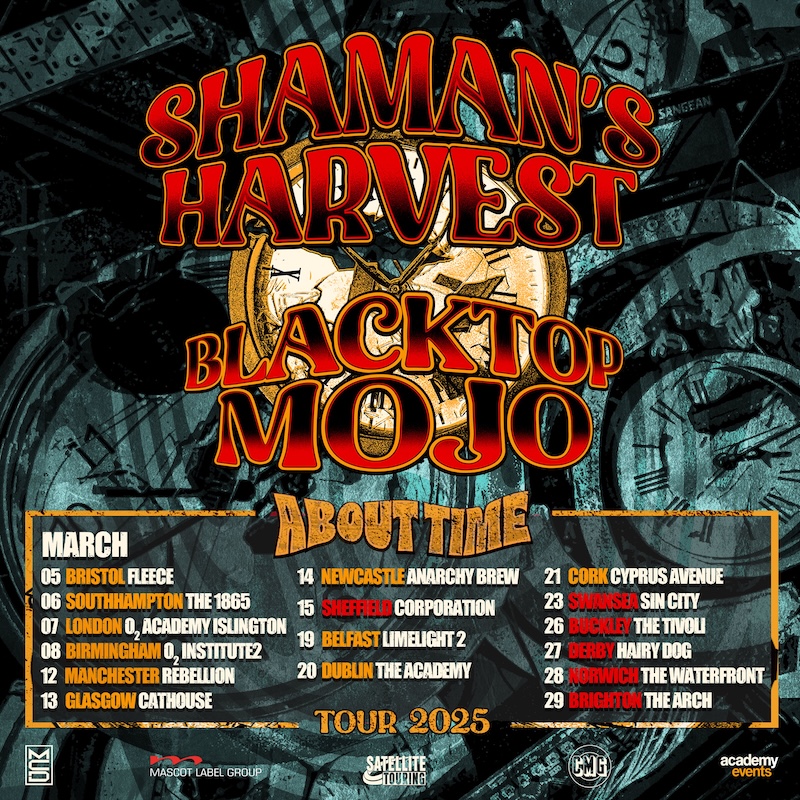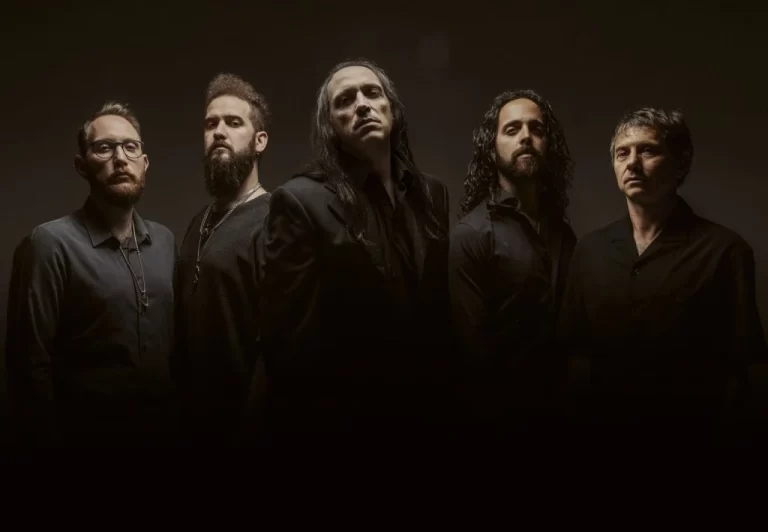Early in 2025, Shaman’s Harvest will make their first ever trip to the UK, which is surprising when you consider the near universal acclaim the band have received, not to mention the significant success they’ve had in their native US. Nevertheless, with 2022’s Rebelator one of the band’s most successful efforts to date, despite the somewhat traumatic circumstances in which it was recorded, now is the time for Shaman’s Harvest, and we were pleased to catch up with guitarist Josh Hamler, who guided us through the band’s recent history.
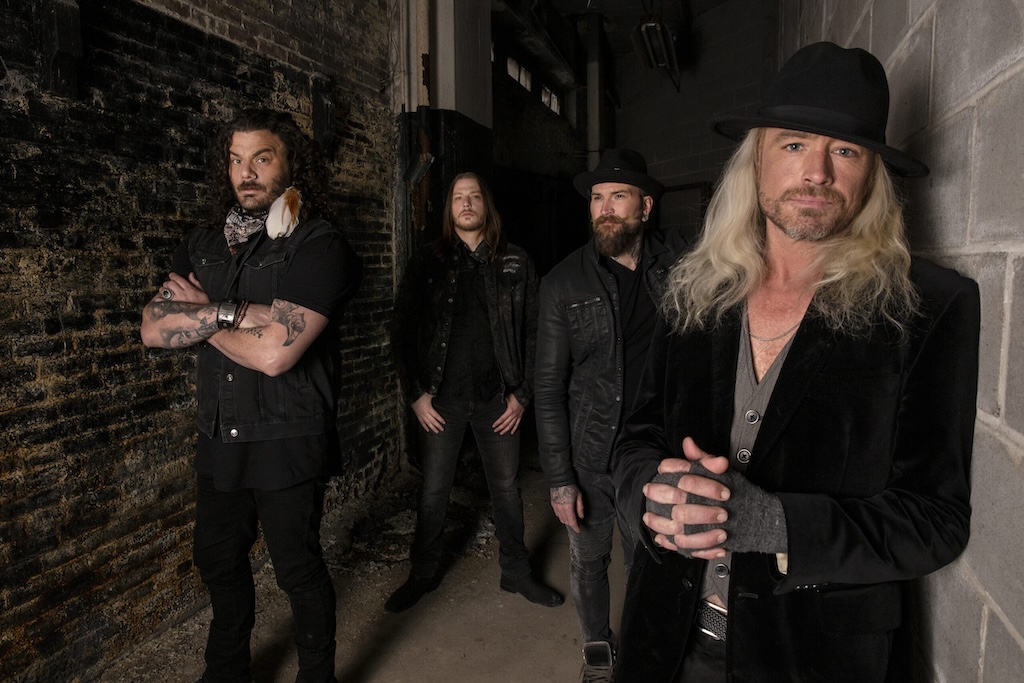
Nice to meet you, thank you so much for taking the time to speak to me.
Likewise, man, I’m looking forward to it.
It’s kind of unusual, because normally when I speak to people, they’ve just got an album out, but of course Rebelator came out about two years back; but you’re just about to embark on… is this your biggest tour of the UK?
It’s our first tour of the UK! Over the years, there’ve been multiple opportunities for us to come over and perform, and we were always opening for some other act. And then, for whatever reason, whether it was family, or an incident, or whatever, the tour was always cancelled, and we never got to take the opportunity. So, this time around, we thought, why not do it ourselves. So, that way, there’re no excuses [laughs]
That seems kind of in keeping with the story behind the album, because Rebelator had so many difficulties in getting over the line. As I understand it, a tornado ripped through your town, like two miles from your studio?
Yeah, it was interesting man! In our town of Jefferson City, historically tornados don’t hit here. We knew that there were tornado warnings that night. Our producer was here recording us, and his manager was calling him and telling him to take cover because there was a tornado on the way, and we were just telling him “Kyle, tornados don’t hit here, man, just go to your hotel – you’ll be fine!” And, ten minutes later, an F4 came through, and it was literally 2 miles from that hotel and about a mile from our warehouse. You know, it was just one of those distractions that we didn’t need at that point of time.
And then, of course, it flooded two days later! So, there was a flood on top of a tornado. And Kyle was in town, and we weren’t being efficient in the studio because of all these external factors happening around us. So, the whole record itself was a jambalaya of events like that, that just somehow thwarted our efforts in getting it done.
And it also seemed like we demoed that record to death. Our demoes were so good that, when we went into the studio, we were chasing the demo half the way and so, it was kind of an interesting learning curve. Every record has always been different, so it’s not like we expected anything other than that, but man, the obstacles for this one were just insurmountable.
It was a weird time for bands – the pandemic caused every band to come to a grinding halt. For some, it was an opportunity to be creative but in a different way, others were torn apart, because they weren’t doing what they loved. For you, in terms of developing the record, you were trying a new approach anyway, because you came off the road and were doing things in a more jammed out format, is that right?
Yeah – you know. For about ten years – starting around 2009 all the way to 2018, we were touring North America close to 300 days a year. And so, as amazing and awesome as that was, and all the opportunities we got because of it, we were all exhausted.
When the pandemic hit, it kind of gave us that breathing room to pop back into our own houses and be part of our families again and not our road families, so to speak. Which was really amazing. Some of us needed that more than others, but, you know, I’m glad it happened the way it did and… I don’t know that we’d still be here today had we not taken that break, just because of how exhausted we were, and all the weight we were carrying, and all the people that we were supporting – our crew and everybody that counted on us. It was just a lot, and so it gave us time to reset.
For song writing, we brought in Kyle Odell. He’s a lot heavier of a producer, not as bluesy and swampy as some of our past records have been. And we needed that in our wheelhouse to show that we’re multi-genre. We can fit in a bunch of different stereotypes of music. We really hadn’t gone down that heavier road, so to speak, in our records with the Mascot label group, so we went there with Rebelator, and it has its really heavy sections, and it has those acoustic moments. It just covers all the moments that influence us in our daily lives.
I think that’s one of the things I really enjoy about the band – there’s a temptation to pigeonhole yourself, particularly now that the internet seems to have pushed people into genre boxes, just because there’s so much choice out there. So, when you get a band that’s not afraid to experiment – and I think musicians do tend to be a lot more open minded than fans in a lot of ways – it’s really exciting.
Yeah, 100% It’s two different edges of the sword. Of course, we’re playing music to please the fans, but at the same time we’re playing music to please ourselves. We have to be the ones on stage giving you an honest interpretation of what we created every night. So, if we don’t believe it, you won’t believe it. So, you know, that’s been our way of thinking over the years, we’ve stuck to it, and it just seems to work so far.
I know in previous interviews, you’ve said that you have a close relationship with producers, and you bring them into the band because you want to have that additional voice. In terms of bringing Kyle in, how much do you think he shaped the sound, especially since the demos were, as you said, so complete?
He really influenced it quite a bit – a lot of the guitar tones. And he’s a phenomenal guitar player, I mean the dude can shred! And he can riff as well – he can do it all! And he had all these interesting combinations of amps to bring in. Almost all of it had a 5150 in it, mixed with other amp heads at the same time. It seemed like the 5150 was a mainstay. And, honestly, I don’t know that we’ve ever used a 5150 on a previous record. So, just little things like that.
And he has a more of a modern ear as opposed to our… aging ears I guess [laughs]. His ears are more on the pulse of today, and we didn’t mind going there with him. We were kind of stuck in 1999 for a while, but you have to grow as a musician and that’s what we were looking to do.
Obviously, you’ve toured with bands like Nickelback and Seether, who are immensely successful artists – did you have the chance to hang out with those guys and trade ideas or anything like that?
We did, we did. It wasn’t non-stop all the time, but Chad definitely gave us his 2 cents on our songwriting style and tried to force in our brains that we’re competing with pop music too. We shouldn’t just compete as a rock band, but we should compete as musicians with the hot 100 charts, not just the active rock chart. So, he tried to open up our vision – our scope – to what we’re trying to accomplish. You know, Chad… we talked about doing some writing sessions together, but it just hasn’t come to fruition yet… I stress yet. Hopefully one day all that will come through and, right now, we released Rebelator two years ago, so we’re in the process of making our eighth record right now. Hopefully next year it’ll be out some time.
And, you know, every record is an evolution for us, and for me personally; what better way to time stamp my life – all these different chapters, through all the different friendships, relationships, musical styles, and what I’ve learned over the years of being a musician – I’m really looking forward to the next version of me coming through the ranks.
Music is such a great time capsule anyway – you can hear something you loved when you were 19, and it sends you shooting straight back there. So, when you’re creating it as well, I guess it’s even more vivid.
Absolutely. Absolutely. It’s kind of like a Nickelback song [laughs].
It’s interesting what you said about Chad reminding you that you’re not competing in one niche. There can be a temptation in harder edged music, I guess, to shy away from hooks as if they’re something negative, but you can be melodic and yet really heavy, and there’s nothing wrong with that.
Yeah, you know, that’s always been my stance on it. Something can be really heavy and yet be acoustic. Like you listen to the words and how it’s being delivered, and it can have sort of a Johnny Cash kind of style. Heavy isn’t just in distortion and palm muting. It’s a term that gets thrown around too easily, I think, or pigeonholed too easily. It can be a lot more than death metal, or heavy metal, or thrash metal, or… metal-metal – there’s a lot of heavy songs that don’t have distortion in them.
The new record is very layered, and it’s a beautiful sounding album – do you have to go through a process of almost deconstructing the songs so that they can be performed live?
Absolutely. You know, especially with this last record, we let Kyle open up the palette and just paint with everything that we could. Everything, for the most part, was real instruments, not digital instruments and stuff, but when it comes to live, we do think about that. There are some parts to these songs, like the outro to Wishing Well that doesn’t make it live, because there’s banjos and all kinds of things in it and we just can’t afford to bring that many paid people with us [laughs].
And, of course, there are a lot of vocal effects on this record. The main one or two we’ll do live, but it’s not going to be like three-part screams or anything like that. You know, it also pushes us individually on stage to be up to snuff, to be able to pull off some of these four-part vocal harmonies. Me, Derek, Nathan, and Adam are singing a lot. I’m not just up there playing rhythm guitar. Sometimes I’m up there playing lead guitar, sometimes there’s two lead guitars, sometimes there’s four vocals going on. We like to push ourselves individually and what we can produce, but what we do on stage is authentic, and I think that anybody who comes to see us walks away knowing that.
One of the things I’ve found with layers, is you might have a guitar part that’s looped all the way through, but on stage, you play a few bars then move to the next passage, but the audience (especially if they know the song) still hear that part, even though it’s no longer there…
Absolutely, yeah, you’re right. It’s that subliminal “yeah, I’ve heard it there before, just because I’m not hearing it right now, I still kinda hear it in my brain,” That’s exactly it, man. And you know, these days technology is what technology is – bands are going to use all the bells and whistles that they can, and most do. We try to keep our stuff as straightforward as possible, and I don’t see that we’re going to change that any time soon. But, you know, some nights it would be nice to have all those little bells and whistles there – for my own listening’s sake, because I was there when we put them there [laughs].
It is really exciting – I think it’s one of the best parts of recording is when you’re throwing those ideas around – maybe another scream in there, or maybe another guitar here – it’s such a cool part of the creative process, especially if you have more time in the studio.
Absolutely. And for years, we’re road dogs, and the only way you can be a road dog is if you love to tour. And we do love touring, but we also really love being in the studio. I wish we would have been in the studio a little more over the years, and less on the road. Because, when you’re on the road touring non-stop, you kind of become a robot. You’re playing the same set almost night after night – you might change a few songs here or there, depending on the record you’re promoting at the time. But it just becomes like, that’s my hour of exercise each day – just being on stage – and I know exactly every move and every step and every breath I’m going to take. It’s just like memory. So, it was good to get off the road and remember what it is to be an artist and not to be a robot. And there’s more to getting up on stage than just performing flawlessly every night. The artistic part, where you get to go create and clash ideas and make a colour out of a sound or tug on an emotion with a lyric. It’s a great feeling, and it just kinda gets numb sometimes.
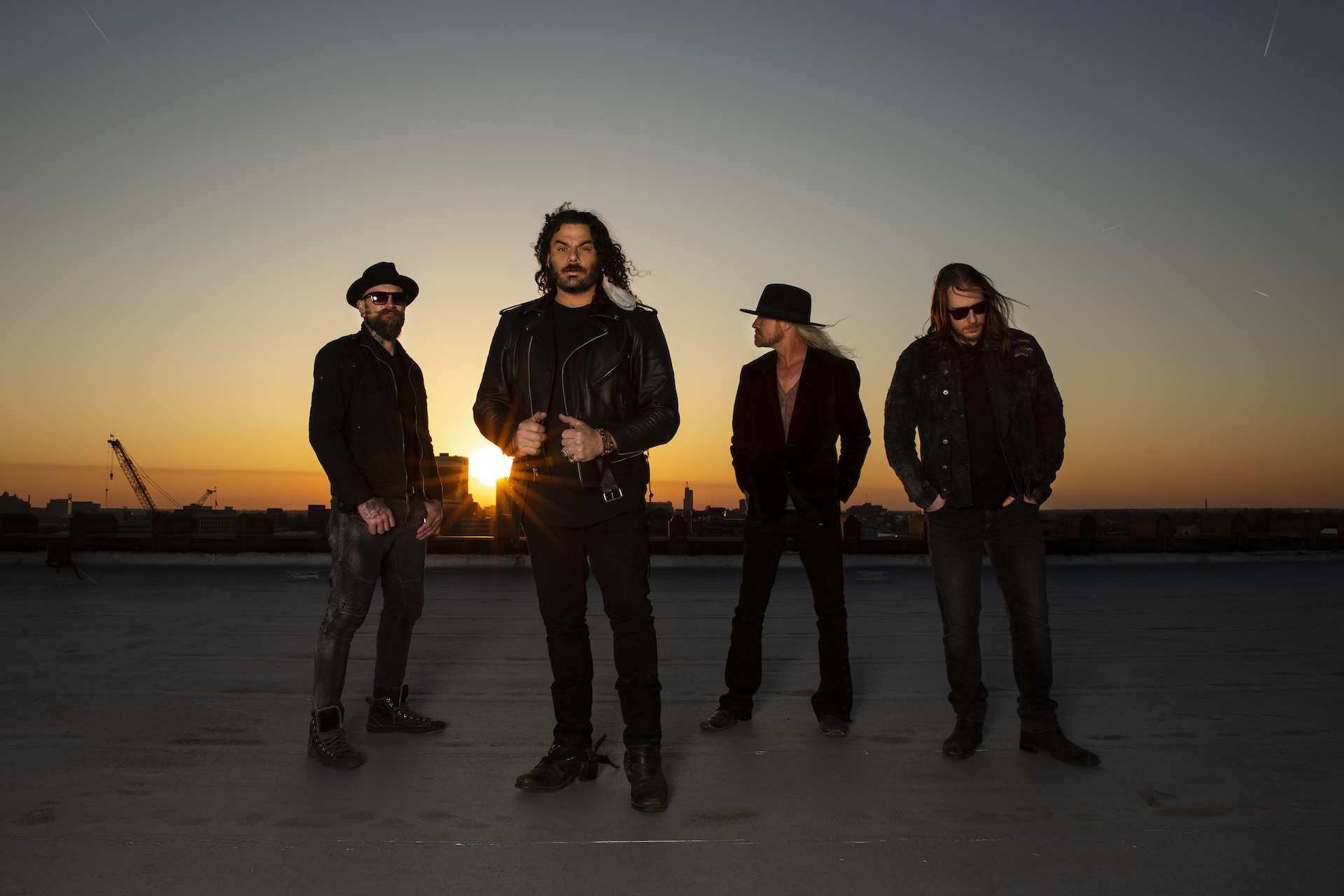
I kind of get the feeling that you guys are a very visual band, and your music is very evocative, so when I listen, I get images of parts of America to which I’ve never been – do you have some idea of what you want to portray in your music?
100% Every song that we create is painting a bigger picture. One that we’re envisioning and, just because we’re envisioning it one particular way doesn’t mean that, if you envisioned it a different way, you’re wrong. That’s the beauty of music – there is no one definitive meaning for a song, or a way it can make you feel. If you feel that way, then mission accomplished.
It’s interesting to be able to, in guitar… I’m more of a colour guitarist. I play a lot of rhythm, and I do things that add colour to the soundscape. That’s what I’ve always considered myself to be, I’m painting colours with my guitar and the vibrations that come from it. And that’s the spiritual moment for me, when it all… *boom* pops into existence, it’s a great feeling. I remember, when we wrote Dragonfly – that song took us literally less than 30-minutes to write from start to finish. It was like a gift from the rock gods or something! It just came out of nowhere. But immediately, this song had this dark colour to me. It just exuded this energy that we hope to find with all our songs, and with some of them it happens easier than others.
That’s kind of how you know a song is great. For some people, they’ll pace around. Others close their eyes. So, for you, is that when you know the song is on the right track – when you start to get the sense of the colour it should be.
Yeah, absolutely, that’s when I know we’re on the right path. But also, you can lose that colour if you go too far. It’s a fine line of how far to take it, or whether to leave it with what was good was good. And that’s tough, and there have been moments where we’ve demoed the life out of songs. Like, once it was so promising, and then three weeks later it’s on the cutting room floor [laughs].
It’s frustrating when that happens, when you refine a song to when it’s nothing.
It loses its character – I don’t know. But that’s part of it, you have to lose a little to win a little and that’s just what we do.
Do you keep all these things/ because sometimes you can return to them later, right? Or do you only move forward from album to album?
We kinda keep things around. You never know when something might rear its head. We may even have a sneaky release that’s going to come out pretty soon, with a song that didn’t make a previous record, but it’s been reimagined and turned into something that I’m really proud of, and I can’t wait for the powers that be to release the dang thing, and then we can talk about it more [laughs].
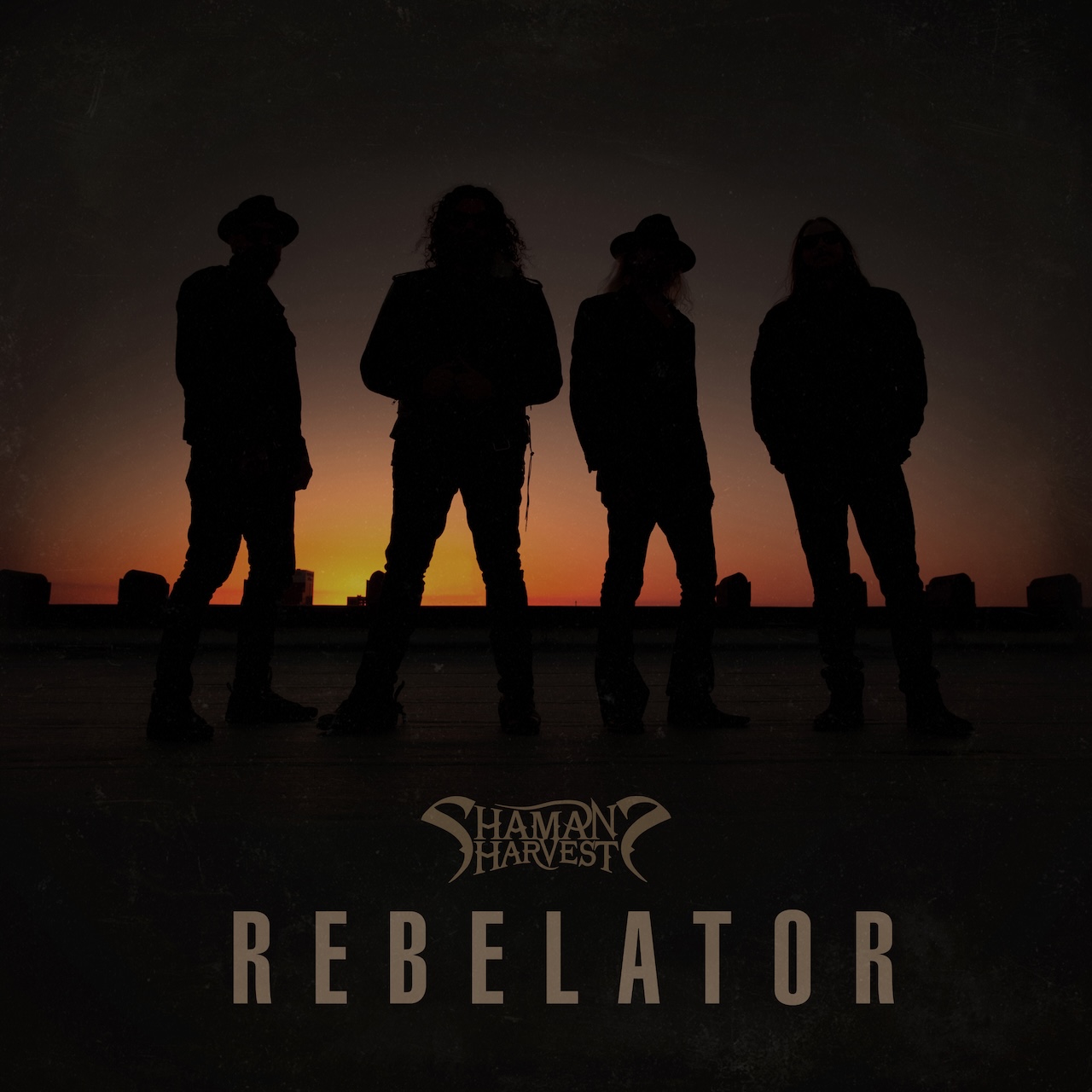
As people are so interested in the visual side of things, I know you’ve said in previous interviews that the artwork is different for every album because it has to reflect thew album – but how involved are you in creating the artwork in the first place?
We’re very involved in it. We’re very involved in all aspects of it. But, of course, we have the fine folks at Mascot and their team of awesome people who help us. But they get frustrated how involved we are [laughs]. We’re thwarting progress because we’re being artistic. We’ve butted heads a few times, but it’s a team effort, and we’re in there making every decision, and we’re a very DIY band – for better or for worse, it’s in our DNA – it’s who we are.
It’s really important – having grown up in the era of vinyl and CD, the artwork is such a major part of the experience. There’s nothing worse than getting some amazing album that has this nothing cover on the front, right?
Right, yeah. I’m a big fan of vinyl and all of my record collection, and all the sleeves that have the lyrics, and the pictures, and the story line, and the history – the whole kit and caboodle. We like to carry on these traditions and hopefully we do it justice.
So, with this being your first ever tour of the UK, do you have plans to cover the whole of your seven-album career?
Well, we’ll play a few songs from each, I guess. You know, most of what we’ll be performing on the tour will be more our modern records, probably from Shine on to Rebelator, and even maybe some of these new songs. But we really want to promote the Rebelator record – it’s our newest to date. Maybe not over there, but here in the States, we’ve amassed quite a few radio hit singles that have been in the top 15, and even a few that cracked the top 10, and we have a cover song of Dirty Diana by Michael Jackson that seems to be a fan favourite everywhere we go. So, there’s going to be a jambalaya of Shaman’s Harvest on display when we get over there.
And, you know, our guys – Black Top Mojo – are coming over with us and doing a co-headline ride with us. Those guys are totally incredible, their musicianship is top notch. They’re their own beast, but we’re two very hungry Southern Rock bands that are going to bring what we’ve got over there, and we can’t wait.
And you’re adding dates due to the massive demand, so it’s clear people are really excited.
Yeah, it’s super cool. And, you know, a lot of these rooms aren’t the biggest rooms but we’re filling them. It’s exciting and, as of right now, we looked at the numbers and it’s already a success. The fact that we got to add six more dates and make the most of our efforts to come over – we’re super thrilled and honoured at the same time. It’s going to be a blast.
Thank you so much dude, any final words for your UK fans who are waiting for you to come?
Hey Phil, thank you man! You know, we can’t wait to come over and share our swampy sounds. We’re going to bring some heavy with us too. So, get out and buy a ticket and, if you’re not buying a ticket to us, go see Black Stone Cherry or something, alright [laughs]
